On a late night last week, I found myself sitting a dark living room with just the dim glow of a laptop screen and a(nother) beer to keep me company.
Utterly lost in cyberspace, engrossed in the World Cup and soaking up every last shred of news available best described my situation.
Around 3am I came across fellow Roarer Ben Pobjie’s article ‘Rugby World Cup, what have we learnt so far?‘ Within the text of this piece, I came across a stanza that really resonated with me:
“We have learnt, as we learn with every Wallabies game, that Australian rugby supporters cannot live without disgruntlement. Australia beat the dangerous wild cards of Fiji comfortably in their first game – certainly more comfortably than New Zealand beat Argentina, and considerably more comfortably than South Africa didn’t beat Japan.
“But as is almost mandatory following an Australian victory over anyone but the All Blacks themselves, the consensus is that the Wallabies were lacklustre, rusty, ineffective, and basically kidding themselves if they think they can go anywhere with that sort of on-field tat.”
Ben clearly had his tongue in his cheek while he penned those words and still, for me at least, he managed to hit a nerve. Like a wry comment from your father to remind you that perhaps your first girlfriend was not a well-considered choice to introduce to your Nan at a family barbeque, the joking tone hides an unavoidable truth.
Australian rugby fans, as a creature, have become cynical and unenthusiastic by nature, like our trans-Tasman brethren who seem almost incapable of enjoying the success of their team. Instead they basically declare a national day of mourning should, heaven-forbid, the mighty All Blacks ever faulter.
Perhaps the most dramatic example of the pressure that the New Zealand public puts on the All Blacks is the way Ritchie McCaw later described his emotions upon hearing the final whistle which signalled his team’s victory in the 2011 World Cup:
“”I bend over, hands on knees. Then sink to one knee. We’ve won. I should be happy. All I feel is relief. It’s finished. I can stop. I don’t have to do this any more.””
Arguably the greatest player to have ever pulled on a jersey, upon captaining his team to the most prolific achievement there is, voices his internal monologue’s almost haunting words; “I can stop”. Such is the weight put on members of the All Blacks by the New Zealand public and such is the weight of being Richie McCaw.
Though the Australian supporter is perhaps not quite as severe, it does appear that we have adopted a similar ‘win or die’ mentality. How have we allowed this to happen? And more importantly, is that how we want the honuor of representing our country to feel to our players?
Let’s start with how it happened.
The year was 2002. Beyond rugby, Australia had just hosted the 2000 Summer Olympics and won the gold in women’s hockey and beach volleyball. Our netball team had won the past three World Championships in a row. Lleyton Hewitt won at Wimbledon. The ICC Cricket World Cup and the number one Test ranking were both ours, as were the Ashes, which had adorned our trophy case for over a decade.
Australia’s dominance over England in Test cricket was so absolute that the nation undertook a campaign to have the winning team be allowed to keep the Darnley urn until such time as they should loses a series. The English of course would not allow this, hiding behind the assertion that the urn was “too fragile for transport” and in fact the property of the Earldom of Darnley – typically bureaucratic nonsense.
Ultimately, the MCC Cricket Museum would never agree to relinquish the urn and it would stay in the Motherland, much to the disgust of all of us convicts down here.
Within rugby, Australia held the William Webb Ellis trophy and the Bledisloe Cup, for the fifth year in a row. The Tri-Nations (now the Rugby Championship) had only slipped away the year before, prior to which we had won it back to back. Had the IRB world rankings existed at the time, the number one position would certainly have read: Australia.
It is fair to say that our little island nation was, in many ways, sitting atop the sporting world.
Australian sports fans, as a result, changed and through a generation of utter dominance, like spoiled children, became entitled and expectant. It was as if victory was our birthright, simply for being Australian.
But if there is one thing history has taught us, all empires will in turn crumble and so too did that of Australian rugby.
Having lost the Tri-Nations in 2002, the Bledisloe was then ripped away in 2003 and from there it was either the World Cup or nothing. The coach was none other than the same Eddie Jones who engineered the Brave Blossom’s historic victory over the Springboks in this year’s tournament. From the outside victory did not really seem possible.
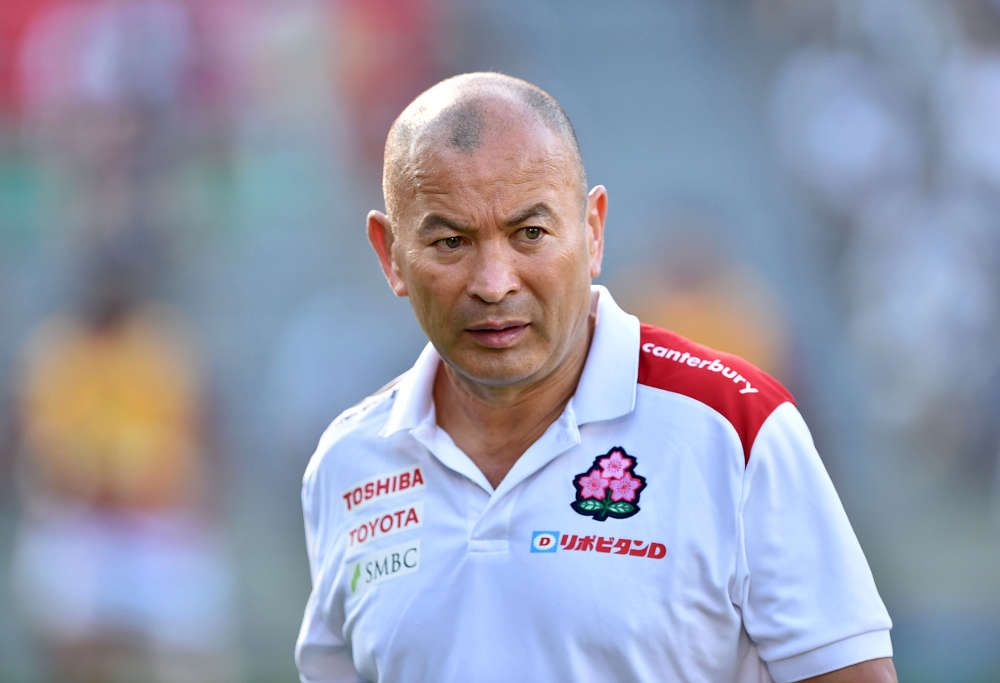 Japan coach and national hero Eddie Jones. (Photo: AFP)
Japan coach and national hero Eddie Jones. (Photo: AFP)
But Australian rugby fans kept the faith. Why wouldn’t they? For the past decade blind faith that somehow the Australian Spirit would triumph over all and be victorious had paid off. Why should the Rugby World Cup circa 2003 be any different?
And that faith came within the finest conceivable margin of being repaid. Only a Jonny Wilkinson dropped goal in overtime, in the hundredth minute of the grand final no less, separated Australia from England and hoisting Bill a record third time.
At the time, no other nation had been victorious in the tournament even twice and to this day no team has won a third.
And as Wilkinson’s right boot connected with that oval ball from just behind the 22 metre line at Stadium Australia it simultaneously connected with the groin of every single Australian fan, leaving behind only a sick feeling in our stomachs and a dull ache that persisted for what seemed like eternity.
I was there that fateful night and have the unenviable memory of watching that last piece of rugby silverware as it was ripped from Australia’s grasp. By England no less, a team that had reached the final playing a particularly unattractive style that flies in the face of the ‘Australian Way’.
The events of 2003 kicked off a long and bitterly cold winter for our national rugby team. Dominance that had been commonplace up until 2002 was replaced by year after year of bitter disappointment.
The World Cup was never really within in reach at the 2007 or 2011 tournaments, the Tri-Nations and its successor the Rugby Championship would not see our shores again for a decade.
But as Ben pointed out, the spoiled, entitled and expectant Australian rugby fan measures success only in victories over the All Blacks, more specifically the Bledisloe Cup that remains beyond our grasp to this day. It has been 13 long years since we hoisted that most coveted of trophies, or to look at it another way – as near as makes no difference half my life.
It’s not really fair though, to judge your rugby team against the past decade’s incarnation of the All Blacks. It’s a bit like comparing your personal fortune to that of Bill Gates – odds are you’re going to be disappointed.
The reason for this is, in no small part, that 2003 was the year was also the first time that a young Dan Carter joined Richie McCaw in the black jersey.
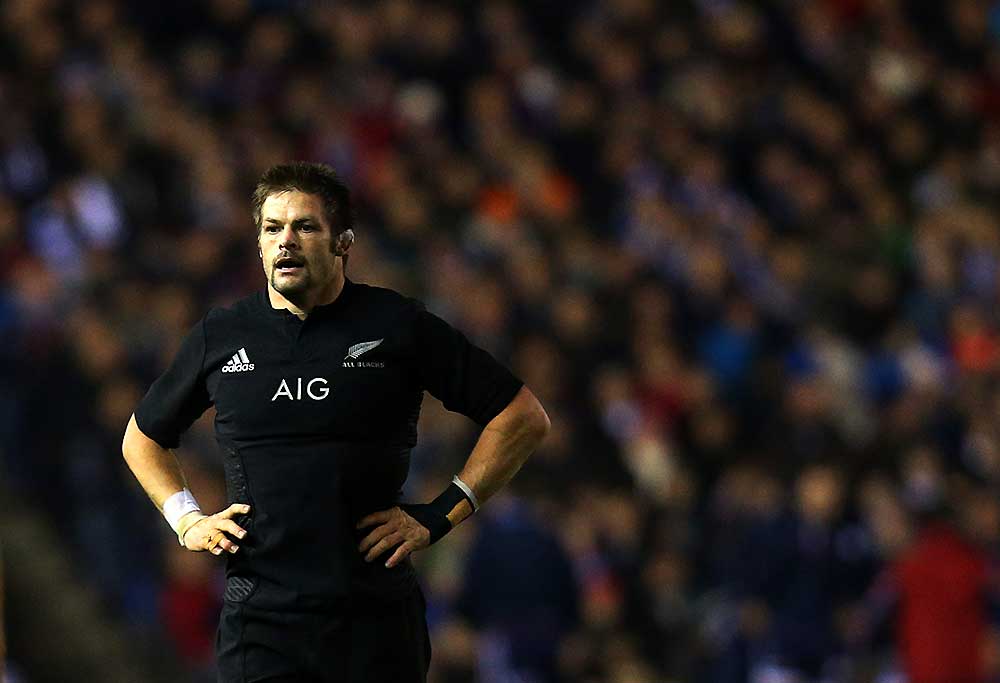 Richie McCaw is a reasonable player, they tell me. (AP Photo/Scott Heppell)
Richie McCaw is a reasonable player, they tell me. (AP Photo/Scott Heppell)
Of course, the success of the All Blacks comes down to more than just these two players. That being said, having arguably the greatest flanker and five-eighth to have played in the professional era occupying a single team simultaneously is without comparison in the rugby universe.
To emphasise just how dramatic the impact of the McCaw-Carter double act is; remember too that with those same two players the Crusaders were able to win four of 8 possible Super Rugby titles between 2000 and 2008. In other words, during that period the Crusaders entered the toughest provincial tournament in the world with a 50 per cent success rate, not for winning games, for winning the whole damn thing.
Only the combination of Glenn McGrath and Shane Warne in the Australian cricket team springs to mind as an example of where two players of such epic profile played within a single team. And as McGrath and Warne oversaw unimaginable success in Australian cricket, Carter and McCaw would usher in the most successful era that New Zealand rugby has ever known.
John Mitchell, Graham Henry and Steve Hansen, the coaches of this era, have maintained simply staggering win records; 84%, 85% and 90% respectively. Against mostly the best competition in the world the All Blacks have, as near as makes no difference, won nine out of every 10 games they have played since 2002.
And so it came to be that Australian fans, the spoiled brats of world sport, had learnt to judge themselves only against a team that has been nigh on unbeatable and in doing so set themselves up for 13 straight years of “failure”.
Never mind that our team was rarely outside of the top three in the world during this time, we couldn’t beat the All Blacks, and that was that.
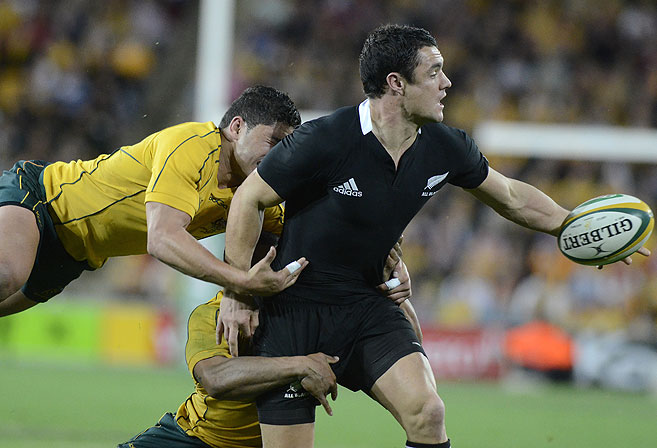 Dan Carter against the Wallabies (AAP Image/Steve Holland)
Dan Carter against the Wallabies (AAP Image/Steve Holland)
Year after year we would see new coaches, new players, new hope and would be crushed by the Blackness. Each time fans would become just that little bit more cynical, that little bit more negative and that little bit less willing to enjoy what others would call the success of Australian rugby.
Like any spoiled brat, when they stopped getting what they wanted the fans chucked a hissy fit. It became so bad that there were numerous occasions in the mid 2000s when the media and the sports grounds would need to run promotions to encourage enthusiasm among the fans.
On one occasion, the absence of green and gold in the stands at Stadium Australia in Homebush was so painfully obvious that the local papers took up the cause, under instruction to stop another “black out”. The campaign had limited success.
It may seem like a moot point, but ponder whether the All Blacks have ever had to ask the fans to get behind them at Eden Park or have the English have ever felt short of support at Twickenham?
It could be argued too that the “spoiled brat” mindset even managed to infest the culture of the team itself. Under then thought super-coach Robbie Deans we entered the era of the Three Amigos, and it though it wasn’t clear at the time, a star player culture had developed.
With the advent of the professional era, the ARU had failed to stop the same disciplinary issues which plague rugby union’s main rival code from seeping in. Even with every effort made to keep these problems from the prying eyes of the public, to even the rank outsider cracks were starting to show.
James O’Connor rocked up to the airport too drunk to board his plane. Quade Cooper ended up being charged with burglary. Kurtley Beale was in and out of rehab for alcoholism. Lote Tuqiri too was suspended for drinking, Wendell Sailor developed an entirely different kind of white line fever, and even as recently as 2013 six players were stood down for hitting the sauce in Dublin.
Without being close to the team, it is impossible to know if the toxic culture Quade Cooper alleged in 2012 did in fact exist, but the evidence would suggest it did.
Whispers in the broader community, from those who know far more about such things than I do, seemed to consistently suggest that the problems in camp Wallaby were very real.
It was reported that early in new coach Michael Cheika’s reign he was confronted by players hurling water bottles and other pieces of rubbish onto the pitch during training and leaving them there, with the expectation that someone else would clean up their mess.
It may seem trivial, but compare that to the recently ousted secret All Blacks tradition of having senior players sweep the sheds in private after a match out of respect for what it means to play rugby and there was clearly a deficiency in the collective mindset.
No doubt exasperated by the complete lack of respect the team showed to the field and it’s staff new coach Michael Cheika, henceforth the “savior of Australian rugby” is said to have made the players pick up every last piece of rubbish before letting them go home.
Oliver Brown’s splendid article furthered my view that Cheika is the the man to, as the cliché goes, put pride back in the jersey and potentially bring back Bill. This quote in particular struck me:
“To that end, [Cheika] is understood to have prepared master documents for his team with headings such as: Who are we? What shall our values be? What do we want to stand for?”
Writing these things down, or more the need to write them down, in itself is a concern. How can a team of such prominence, of such proud heritage not have instilled those values in every single player from the first day they entered camp? Perhaps they didn’t even know what they were playing for, beside money, anymore.
Brown also illustrates a squad where the players have learned to accept that they are on “Cheika time” which is to say that the coach rather than the clock decides when a team session is over.
Lineout wizard Rob Simmons punctuates the point magnificently “[Cheika’s] the kingpin.”
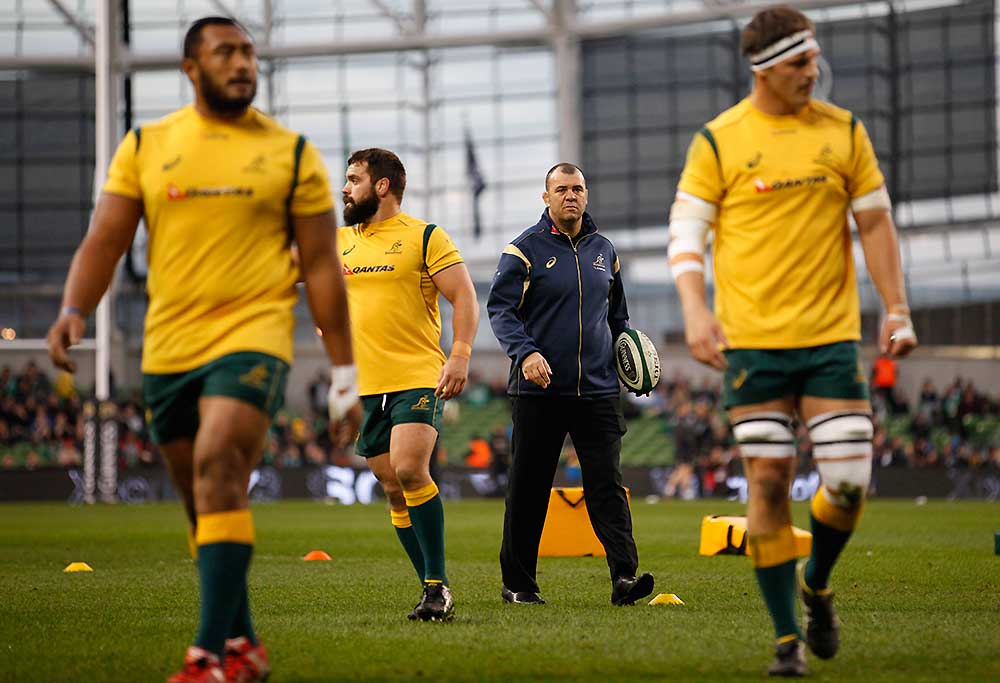 Michael Cheika is the man. (AP Photo/Peter Morrison)
Michael Cheika is the man. (AP Photo/Peter Morrison)
And this is why Cheika is the only coach to have ever secured both the Heineken Cup and Super Rugby trophy and why he is right for the Wallabies; the understanding that rugby is a game more about culture than individual talent. No one man is greater than the team. Ever.
Having already engineered a remarkable turnaround in Australia’s fortunes that have seen us ascend form sixth to second in the World Rankings, Cheika must now perform his final miracle. Regardless of the result of the Rugby World Cup he must resurrect the faith of the Australian fan.
At least, the timing is right. For those who remember, the retirement of Glenn McGrath and Shane Warne was the end of the Australia’s invincibility in cricket that I described above. Within a couple of years they had gone from being untouchable, to just being very good.
My prediction is that the retirement of Carter and McCaw will have a similar impact on the All Blacks which is a good thing if we are to compare ourselves only to the men in black.
But if we are to take out that coveted top spot, we must move past the events of 2003. We must recover from that proverbial kick in the nads and avenge the insult of being beaten by our most bitter rivals, England, at a home World Cup final in the most unsavory manner imaginable – a drop goal.
Wales’ courageous 28-25 victory over England in Pool A despite no less than six major injuries gives us the opportunity to do just that. All it will take is for Australia to beat England this weekend.
Doing so would all but eliminate England’s hope of progressing out of Pool A, the Pool of Death. If they achieve this, Australia would repay the insult of 2003 by making England the first tournament hosts in the history of the tournament to fail to qualify for the quarter-finals, with Twickenham as the stage no less.
Whether it’s best served hot or cold, no one can convince me at this point that revenge would not taste sweet.
If that happens it’s high time that Australian fans appreciate the current crop of Wallabies for what it is – exceptional, and stop relentless berating the team for even the strongest of performances.
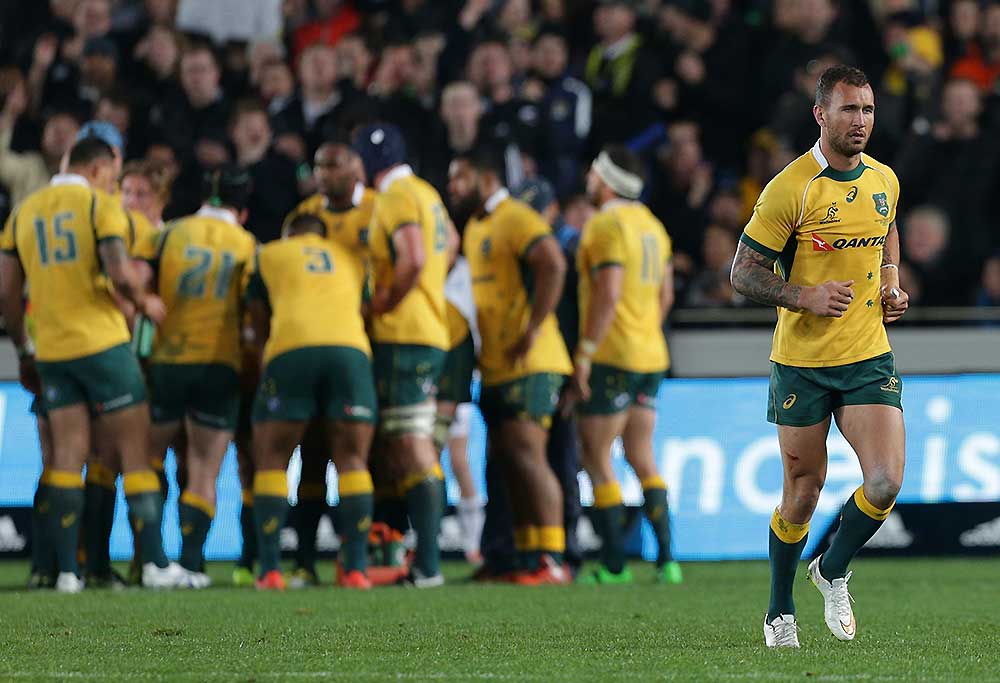 Get around the boys! (AAP Image/ David Rowland)
Get around the boys! (AAP Image/ David Rowland)
Truthfully though, regardless of the result of the match against England it really is time for fans and journalists in Australia to stop playing the cynic either way.
Yes, we did not beat Fiji by as much as we would have like and in beating Uruguay by the largest margin of any match in the tournament we looked scrappy – but the fact of the matter is that we have ascended to second in the world under a once in a lifetime coach and that this point we have as good a chance of bringing home the goods as anyone.
It’s easy being cynical. If you never let yourself get excited about your team’s prospects then you don’t have to be disappointed when they lose. But the Wallabies are not losing, in fact, the have been doing phenomenally well for a team who have had less than a year to find their feet again.
In the spirit of the Roar’s campaign to get behind the Wallabies, I’m going to be the one to say it: Nothing we can say or do at this point is going to make the Wallabies any better, so it’s time to stop being the spoiled brats of the sporting world and throw our support, absolutely and without reservation, behind our national team simply because they are our national team.
If we can do that, and with any luck take down England on the way, we have every chance of success in our efforts to take out the game’s highest honor and capture that third title which eluded us all those years ago.
Go Wallabies!
Oh and one last thing: #ScrumStraightJoe (thanks Brett!)





























































































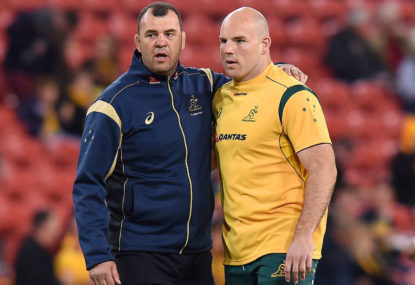
 Japan coach and national hero Eddie Jones. (Photo: AFP)
Japan coach and national hero Eddie Jones. (Photo: AFP) Richie McCaw is a reasonable player, they tell me. (AP Photo/Scott Heppell)
Richie McCaw is a reasonable player, they tell me. (AP Photo/Scott Heppell) Dan Carter against the Wallabies (AAP Image/Steve Holland)
Dan Carter against the Wallabies (AAP Image/Steve Holland) Michael Cheika is the man. (AP Photo/Peter Morrison)
Michael Cheika is the man. (AP Photo/Peter Morrison) Get around the boys! (AAP Image/ David Rowland)
Get around the boys! (AAP Image/ David Rowland)